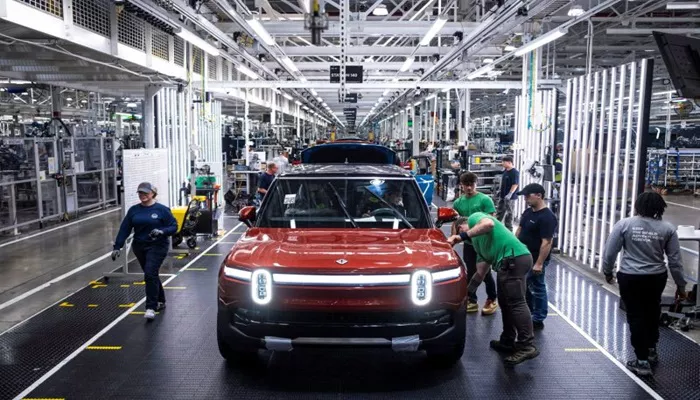Since the launch of the “Anti-Internal Competition” initiative on May 31st, concerted efforts have been underway to foster the healthy and upward development of the automotive industry. “Anti-Internal Competition” has now become a shared understanding among automakers.
Discussions at the 2025 China Chongqing Auto Forum
On June 6th, executives from several major automakers deliberated on the topic of “anti-crowding” at the 2025 China Chongqing Auto Forum. Zhang Xinghai, Chairman of the CEASIS Group, emphasized that “competitive crowding” poses risks to the stability of the industrial chain. It leads to a lowering of safety standards among component manufacturers, weakens the profitability of vehicle manufacturers, reduces innovation in services, and undermines product quality and safety assurances.
Identifying Industry Challenges
Zhu Huairong, Chairman of Changan Automobile (12.840, -0.14, -1.08%), pointed out four key issues plaguing China’s automotive industry. First, there is an overabundance of brands and excessive production capacity. Second, prices are in disarray, with a concerning trend of this chaos spreading overseas. Third, excessive hype is causing misleading effects. Fourth, some capital investments lack a focus on long – term healthy development.
BYD’s Response and Proposals
Li Yunfei, General Manager of the Brand and Public Relations Department of BYD Group, made his first public remarks on the “anti-crowding” topic at the forum. He declared that BYD would leverage technological innovation to combat “crowding” and presented four initiatives. These include being accountable to consumers by rejecting exaggerated promotions, eschewing speculative marketing based on mass production, competing based on technology and products while resisting false claims and unfair practices, and cracking down on rumor – mongering.
When addressing the issue of preventing internal competition among Chinese – brand cars from spilling over into other markets, Li Yunfei noted, “The pricing of vehicle models is determined by the relationship between supply and demand, cost – based pricing, and brand – based pricing. In overseas markets, our products need to be tailored to local conditions. There is no individual entity; we operate as an integrated whole.” Li Xiyong, Executive Vice President of Chery Automobile, suggested that qualifications for car exports should be reviewed.
Li Yunfei also stressed that enterprises should focus on proper business practices and standardize their publicity efforts. “Initially, BYD avoided internal competition, and there was clear differentiation within the company,” he added.
Not long ago, Li Bin, Founder and Chairman of NIO Auto, told First Finance that a simple price war would push the industry into an unsustainable competitive situation. He hopes that the industry can concentrate on technological innovation and user services to ensure the healthy and sustainable development of the entire sector and maintain the hard – won success of China’s new energy vehicles.
The Price War and Its Repercussions
Starting from the end of March this year, many models under BYD’s “Daiyue” and “Ocean” brands have been offering monthly limited – time promotions. In June, BYD officially announced discounts and subsidies for a total of 22 models, with effective price cuts ranging from 12,000 to 53,000 yuan. This move was soon followed by nearly 70 models in the car market, raising concerns about a full – fledged price war and triggering a significant reaction in the capital market.
Industry and Government Responses
The Industry Association’s Initiative
On May 31st, the China Association of Automobile Manufacturers issued an “Initiative on Maintaining a Fair Competition Order and Promoting the Healthy Development of the Industry.” It stated that the chaotic “price war” has exacerbated vicious competition, further squeezing enterprises’ profit margins. This, in turn, affects product quality and after – sales service guarantees, hindering the healthy development of the industry, endangering consumers’ rights and interests, and posing potential safety risks.
Government Support and Commitment
On the same day, an official from the Ministry of Industry and Information Technology expressed agreement and support for the initiative proposed by the China Automobile Industry Association. The ministry will step up efforts to rectify “internal competition” within the automotive industry, promote industrial structure optimization and adjustment, strengthen product consistency inspections, collaborate with relevant departments for anti – unfair competition law enforcement, take necessary regulatory measures, and firmly safeguard a fair and orderly market environment to protect consumers’ fundamental interests.
The official from the Ministry of Industry and Information Technology also emphasized that the disorderly “price war” among enterprises is a typical manifestation of “internal competition.” It impacts product quality, performance, and service levels, harms consumers, and jeopardizes the healthy and sustainable development of the industry. “Price wars have no winners and no future,” the official said. The ministry encourages enterprises to reduce production costs through technological and management innovation, continuously improve product and service quality, fulfill social responsibilities, build a positive brand image, and drive the high – quality development of the automotive industry.
The Ministry of Commerce’s Stance
On June 5th, at a regular press conference in Beijing, He Yongqian, a spokesperson for the Ministry of Commerce, addressed the “internal competition” phenomenon in the automotive industry. He stated that the Ministry of Commerce will actively cooperate with relevant departments to strengthen comprehensive rectification and compliance guidance, maintain a fair competitive market order, and promote the healthy development of the industry. He Yongqian also highlighted that the automotive industry is a strategic and pillar industry of the national economy and an important area for stabilizing growth and expanding consumption. In recent years, the ministry has deeply implemented the car trade – in program and the reform pilot of automotive circulation consumption, continuously unleashing automotive consumption potential and cultivating new consumption growth points. Recently, relevant departments of the ministry have organized discussions with industry associations, research institutions, and related enterprises, solicited opinions and suggestions, and are studying further measures to enhance automotive circulation consumption.
Related topics:
- What does dow jones futures Mean and How Do They Impact the Financial Markets?
- Guotai Haitong (601211): All Main Business Growth Rates are Impressive, and Consolidated Financial Statements Support a Significant Increase in Net Profit.
- How to find future value of ordinary annuity: Mastering Financial Planning

